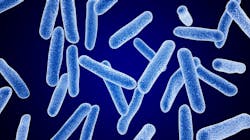Study: wastewater is a prime environment for antibiotic resistance
Wastewater is a more potent environment for antibiotic resistance to evolve than previously known, according to a study from the University of Gothenburg, Sweden,
The study finds that wastewater’s unique characteristics can foster the spread of antibiotic resistance genes in disease-causing bacteria.
Microorganisms have produced antibiotic molecules long before we started to use them as medicines. Accordingly, the ability of many environmental bacteria to defend themselves against antibiotics is ancient.
Since the introduction of antibiotics in the clinics, disease causing bacteria have also started to accumulate more and more resistance genes in their DNA. This still ongoing process requires that genes, that were previously well anchored in the chromosome of certain bacterial species, first gain the ability to move around and eventually jump between species.
In a study published in the journal Communications Biology, researchers at the Centre for Antibiotic Resistance Research (CARe) in Gothenburg, Sweden present evidence for where the genes could gain their ability to move.
Important to prevent the emergence
It is known that wastewater contains residual antibiotics that could favor the development of antibiotic resistant bacteria. New evidence show that wastewater also has characteristics allowing the resistance genes to start their journey from harmless bacteria to disease-causing bacteria.
Antibiotics alone cannot drive this process. The species carrying the resistance genes in their chromosome also needs to be present, as well as specific sequences of DNA that could provide the ability to move the resistance genes.
By studying DNA from thousands of samples from different environments, the researchers could identify the environment where all these key components came together: wastewater.
"In order to fight antibiotic resistance we cannot focus only on preventing the spread of those types of resistant bacteria that are already in circulation, we also need to prevent or delay the emergence of new ones", says Fanny Berglund, researcher at the Sahlgrenska academy at University of Gotheburg and the lead author of the study.
The same research team has published several other studies showing that wastewater harbors a huge variety of different resistance genes, many more than the resistance genes that we see today in bacteria that cause disease.
This makes the environment a vast source for new resistance genes that could acquire the ability to jump between species, to eventually end up in pathogens. Polluting the environment with antibiotics could accelerate this development.
"There is a lot of focus on reducing antibiotic use in humans and animals,” says Berglund. “This is of course important, but our study shows that we also need to pay attention to our waste streams, as this seems to be a place where new variants of antibiotic resistance could emerge.”
